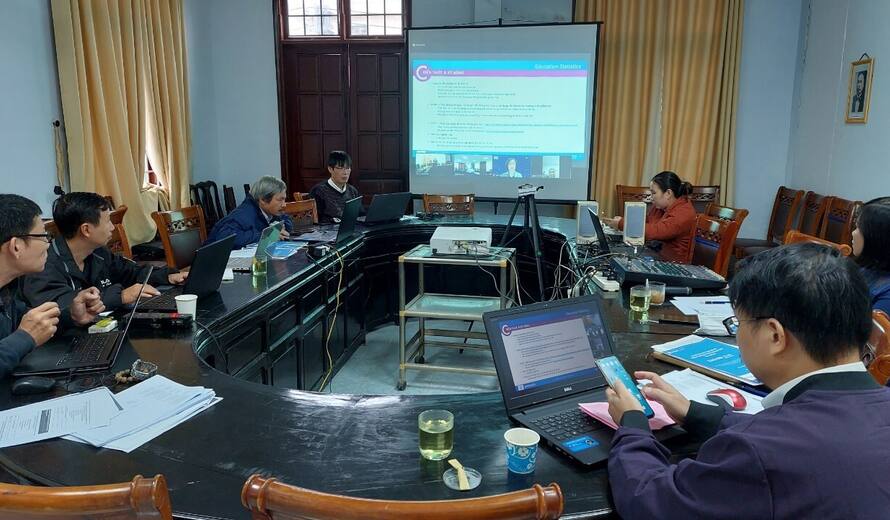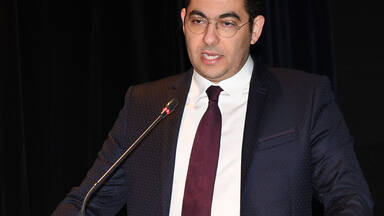Viet Nam and city of Hue kick-off workshop for the Culture|2030 Indicators
UNESCO, Viet Nam and Hue city organized the Launch Workshop of the UNESCO Culture|2030 Indicators’ project implementation.
The pilot implementation of the Culture|2030 Indicators’ framework has been launched in Viet Nam and in Hue city. The launch workshop was organized by the Ministry of Culture, Sports and Tourism and the Local Government of Thua Thien - Hue, in close collaboration with UNESCO, on 10 and 11 November 2021, and gathered 32 participants, including representatives from the National and Local Authorities, as well as civil society organizations, academy, private sector, and other competent entities whose work is informed by culture.
In line with UNESCO’s commitment to advocate for the essential role of culture in sustainable development, the UNESCO Thematic Indicators for Culture in the 2030 Agenda for sustainable development (Culture|2030 Indicators) is a conceptual and methodological framework of thematic indicators whose purpose is to measure and monitor the progress of culture’s enabling contribution to the national and local implementation of the Goals and Targets of the UN 2030 Agenda for Sustainable Development.
The framework has been developed by UNESCO in collaboration with the UNESCO Institute for Statistics (UIS), with the aim to assess both culture’s role as a sector of activity, as well as the transversal contribution of culture across different SDGs and policy areas. The UNESCO Culture|2030 Indicators framework maps the SDGs in 22 Indicators, across four thematic Dimensions: Environment & Resilience, Prosperity & Livelihood, Knowledge & Skills, and Inclusion & Participation.
The project’s framework and methodology make culture visible, provide a thematic overview, build messages and advocacy, inform national and local policies and actions, help understanding trends and build knowledge, and monitor the global progress of culture in the realization of the UN 2030 Agenda for sustainable development.
The project benefits from capacity building materials led and delivered by UNESCO, as well as from the guidance and technical support of the UNESCO International and Regional Experts in close collaboration with the National and Local Authorities’ implementation Teams, at country and city levels. The implementation of the UNESCO Culture|2030 Indicators in Viet Nam and Hue city was made possible thanks to the generous financial contribution of the European Union and the Swedish International Development Agency, Government of Sweden, with the support and the partnership for the national and local implementation from the Ministry of Culture, Sports, and Tourism, and the Local Government of Thua Thien - Hue. The said project is implemented in close cooperation with the UNESCO Hanoi Field Office.
The Workshop introduced the methodology of the UNESCO Culture|2030 Indicators framework, and shared capacity building materials with the authorities and actors. The UNESCO Regional and International Experts present also shared trends and experiences of the process of collecting resources and analyzing Data.
Mr. Ernesto Ottone R. , the Assistant Director General of UNESCO for Culture, shared introductory remarks on the UNESCO Culture 2030 Indicators project. He explained the development of the methodology, the framework itself, and the major implementation steps at national and local levels. He also addressed how these voluntary indicators contributed to the realization of the UN 2030 Agenda and its 17 SDGs, at the national and local levels, as well as to the National Voluntary Reviews and Local Voluntary Reports for countries and cities.
Ms. Jyoti Hosagrahar, Deputy Director of the UNESCO World Heritage Centre, shared an introduction to the UNESCO Culture 2030 Indicators project. She explained the development of the methodology, the framework itself, and the major implementation steps at national and local levels. She also addressed how these voluntary indicators contributed to the realization of the UN 2030 Agenda and its 17 SDGs, at the national and local levels, as well as to the National Voluntary Reviews and Local Voluntary Reports for countries and cities.
Ms. Nguyen Thi Thu Phuong, the Deputy Director in Charge of the Vietnam National Institute of Culture and Arts Studies, delivered the welcoming messages for the workshop.
In the opening remark, Assoc. Prof. Dr. Nguyen Thi Thu Phuong, the Deputy Director in charge of VICAS, emphasized the significance of having adequate methods and techniques to measure and monitor the contribution of culture to development. With this in mind and on behalf of VICAS, she expressed the institute's pride of being assigned by the MoCST to be part of the pilot project led by UNESCO. In this context, he said: “The UNESCO Culture|2030Indicators aims to embrace and apply UNESCO research findings in the collection and analysis of quantitative and qualitative data in the cultural sector. In this framework, Vietnam and Hue City was selected to implement the pilot project of Culture|2030 Indicators. This will help provide profound and systematic assessment for us to clarify and better understand the contribution of culture to the sustainable development, making culture more visible so that we can raise awareness, spread good values, and letting culture become one of the important pillars, on our national development pathway in equality with national economy, politics, and society.”
An introduction to the methodology of the framework, prepared by UNESCO, was presented by the UNESCO Regional Expert, Ms. Ha Nguyen.
During the Workshop, the UNESCO Regional Expert, the involved National and Local Authorities, and various actors exchanged and discussed the UNESCO Culture|2030 Indicators from different perspectives and through its 22 Indicators and its 4 Dimensions.
Dr. Nguyen Thanh Hoa, the National level expert, within the Implementation Team, while presenting the policy reviews on the Cultural Indicators and SDGs of Vietnam, reflected the fragmentation of the existing cultural statistics’ system in Vietnam and pressed on the importance of quickly developing a national cultural statistical framework in which, Culture|2030 Pilot project in Vietnam and Hue city will definitely set a solid ground for achieving that long term aim.
At the end of the workshop, Assoc. Prof. Dr. Nguyen Thi Thu Phuong from VICAS, extended her warm gratitude to all the participants for their valuable contribution during the very first phase of the pilot implementation of the Culture|2030 Indicators in Vietnam. Speaking on behalf of VICAS, she stressed the determination of the implementation team and the active partnership with stakeholders as key factors leading to the success of the project.
After the workshop, representatives from key stakeholders including the Department of Cultural Heritage (MoCST), the Vietnam National Institute of Educational Sciences and the General Statistics Office of Vietnam were very supportive of the project and expressed their strong commitment to the implementation of Culture|2030 Indicators in Vietnam. The workshop participants shared their experiences on the extracting data process from various organizations and institutions.
For further information on the UNESCO Culture|2030 Indicators project, we invite you to explore the following webpage: UNESCO Culture|2030 Indicators
Viet Nam, Hue City



